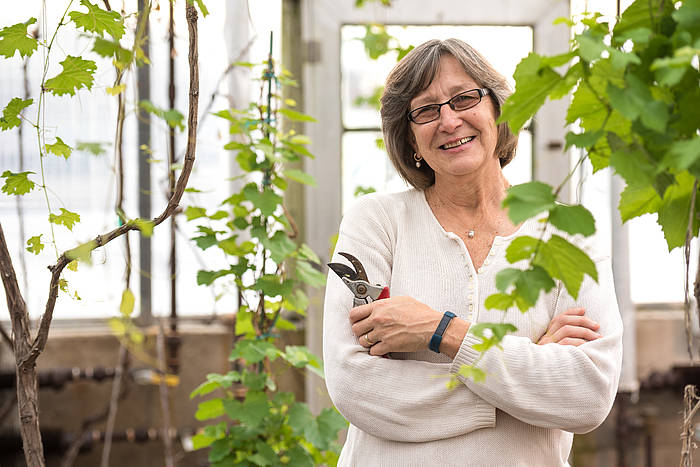
Harlene Hatterman-Valenti loves to savor dry, red wines.
And since 2011, the NDSU researcher has been on a quest to produce the perfect grape for winemakers of the northern Great Plains.
The professor of plant sciences and high-value crops specialist is conducting intense research, breeding grapes that both grow well in northern climates and produce outstanding wine. She is leading a project called the “North Dakota Cold Hardy Grape Initiative,” a germplasm enhancement program to develop grapes suitable for places like North Dakota, Montana, Manitoba or Saskatchewan.
Hatterman-Valenti’s goal is to help the burgeoning grape and wine industry in a region famous for its harsh winters. That’s a tough mission when January temperatures can plummet to 30-below Fahrenheit, killing some of the vines in a vineyard. In addition, hybrid grapes must be early ripening, because of the area’s short growing season.
“We can’t grow Vitis vinifera cultivars like Merlot or Chardonnay in North Dakota. They are impossible to grow here,” explained Hatterman-Valenti. So, she is focusing on inter-specific crosses that have a grape native to the region in their parentage. It’s called Vitis riparia, or more commonly known as the river bank grape.
“The fruit are small and very dark purple that occur in small clusters,” she said, noting its primary attribute is that it is a cold-hardy species, capable of surviving bitterly cold winters.
The commercial grape and wine industry is relatively new in North Dakota, with the first bonded winery established in 2002. There are now 15 wineries that make grape-based wine.
Beta and Valiant are the established grape cultivars that are currently being grown with the most dependable yields, but the quality of wine often falls short of the expectations from winemakers and potential customers. It’s the lack of hardy grape cultivars that consistently produce fruit that is proving to be an obstacle for North Dakota’s emerging industry.
That’s why Hatterman-Valenti’s work is being closely watched by the region’s vintners and wine lovers, alike.
“Our research objective is to come up with at least one red wine grape and one white wine grape that can withstand North Dakota’s environmental conditions,” she said. “We’ve crossed Vitis riparia germplasm with as-cold-hardy-as-possible and short-season Vitis vinifera germplasm that has excellent wine quality, and we are developing our own germplasm for crossing.”
It is time-consuming work that requires patience. Success in plant breeding can take 10-15 years, or longer.
“Working with a woody plant perennial makes it even harder and often longer. Here, it takes at least three years to go from germinating the seed to getting fruit, so we are doing everything possible to hasten fruit production,” Hatterman-Valenti said, noting that cold-hardy grapes can produce fruit with herbaceous flavors, lacking tannins, and very high acidity; so, culling those individuals as soon as possible is important.
“Plant breeding is always a numbers game; you need to have enough unique offspring to find the needle in the haystack.”
It takes dedicated people to keep the process going. Hatterman-Valenti credits her team – research technician Collin Auwarter, post-doctoral researcher John Stenger, doctoral student Andrej Svyantek and Brittany Olson, a former graduate student who now works for E&J Gallo in California. “No one can do this work alone,” she said.
So far, the researchers have transplanted about 15,000 unique offspring, with only approximately 200 producing fruit for sensory evaluations. Wine samples produced from this year’s chosen grape vines are now awaiting sensory evaluation.
There is always hope the cold weather-resistant cultivar that leads to wine with the perfect nose, taste and finish may lie somewhere around the corner.
“Right now, we have 12 individuals in replicated trials, and there are two that we are really looking at,” said Hatterman-Valenti. “I think a lot of good things are yet to come.”
As a student-focused, land-grant, research university, we serve our citizens.